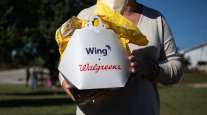Alphabet Taps Brakes on Delivery by Drone Project

The latest Google drones have just started taking flight in the real world. But the team behind the technology is slowing down, trimming headcount and shelving initiatives as the experimental unit becomes the latest target of tightening budgets across parent company Alphabet Inc.
Project Wing, a unit of Alphabet's X research lab, nixed a partnership with coffee giant Starbucks Corp., according to people familiar with the decision. Following the departure of project leader Dave Vos in October, the unit also froze hiring and began asking some staff to seek jobs elsewhere in the company, according to some of those people. They asked not to be identified for speaking about private company moves.
RELATED: Google exec says package delivery by drone possible within a few years
The decisions are part of a broader Alphabet effort to rein in spending and try to turn more experimental projects from loss-making risky bets into real businesses. Drones are in a particularly knotty place. U.S. federal regulation does not yet allow them for delivery, except in select test zones. However, Alphabet's deceleration comes as other technology companies, including Amazon.com Inc., plow money into drone delivery.
"Project Wing has the potential to remove a big chunk of the friction in how physical things are moved around in the world," a spokeswoman for X wrote in an e-mail. "What we’re doing now is developing the next phase of our technology, and as always are thinking in a very broad way about all the potential use cases for delivery by unmanned aerial systems."
In August, Project Wing won approval for test flights at a U.S. site, part of a White House effort to encourage unmanned vehicle delivery. Then in September, Alphabet announced a new foray: a partnership with Chipotle Mexican Grill Inc. to deliver food via drone at Virginia Tech.
RELATED: Google tests drone delivery with burritos for undergrads
Robotic burrito drop-offs are a far cry from Google's initial aims. The unit first wanted to deploy drones to deliver health-care items, such as medicine and heart defibrillators. After those plans were scrapped, the unit moved to food and other perishables.
Alphabet was in advanced talks with Starbucks and had tested delivery with the coffee-chain operator, according to two people familiar with the plans. Those plans were nixed, largely over disagreements about the access to customer data that Alphabet wanted, according to a former X employee.
A Starbucks representative didn't respond to a request for comment on Nov. 8.
RELATED: DHL completes three-month test of delivery drone
Similarly, the unit was in talks to provide suburban grocery delivery in Ireland, where drone rules are less stringent than in the U.S. Amazon's Prime Air service, a competing effort to use unmanned vehicles, announced it was testing with the British government this summer.
The status of Project Wing's effort in Ireland is unclear. An X spokeswoman declined to comment on those talks, as well as the Starbucks partnership and hiring decisions.
Project Wing, like many efforts inside X, has shifted directions several times. Early on, under the leadership of Massachusetts Institute of Technology roboticist Nicholas Roy, it operated like an academic research project, according to former employees. Vos, who joined Google in 2014, steered a different course. The aerospace veteran increased simulation testing for the drones and implemented a new product review system that reflected standards in the aviation industry, which are more rigorous than software testing, the former employees said.
Project Wing also hinted at aspirations aligned to Google's mission — data collection along with delivery logistics. Last year, Vos detailed Project Wing's ambition to run an air-traffic control hub for a drone-based economy. He described plans to equip drones with radio transponders that communicate with controllers and other aircraft by 2020.
Then Vos suddenly left. Alphabet did not name a successor. The project now reports to Astro Teller, the longtime chief of X. Vos did not immediately respond to e-mails seeking comment on Nov. 8.
Teller is still making bold predictions for the technology. In an interview published Nov. 8 with The Verge, Teller said the drone program could spell the end of an ownership society and "really dramatically, magically, change the world."
However, the drone team is now undergoing similar financial scrutiny as other Alphabet experimental arms, such as its Google Fiber and robotics units. Several Project Wing employees have received "90-day notices," which are requests to find different jobs inside Alphabet before being terminated, according to one person familiar with the decision.
Last November, Vos told an aviation conference that Project Wing planned to have a "commercial business up in running in 2017." It is unclear if his exit and the staff changes will delay that timeline. Some in the nascent industry are skeptical that any company can move beyond test sites in the U.S. in the next one or two years, given Federal Aviation Administration restrictions.
"You're not even allowed to ask for a waiver to fly behind the visual line of sight if it's delivery," said Gretchen West, a drone specialist at law firm Hogan Lovells, who is not familiar with Project Wing's plans. "Nobody knows how long it's going to take."




